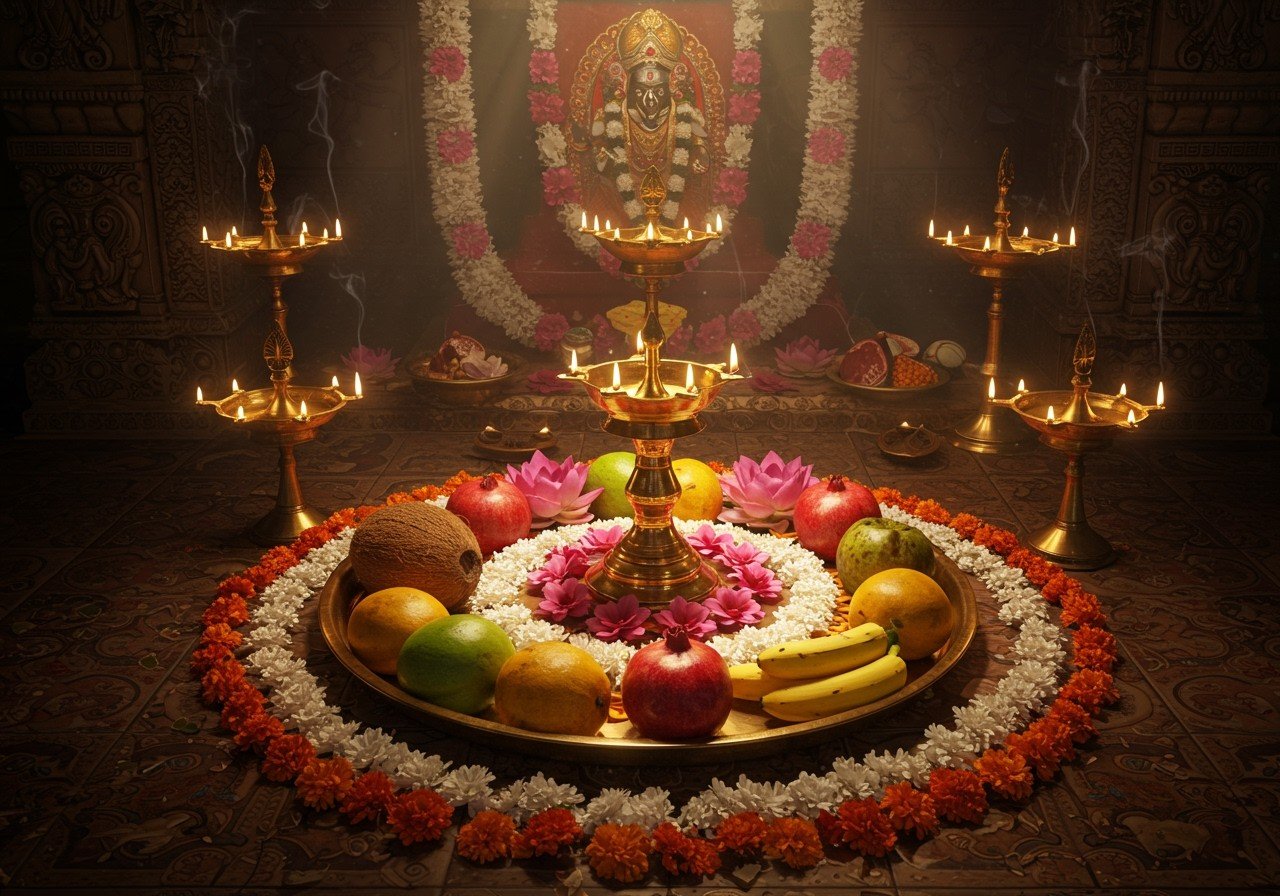The Sacred Role of Flowers and Fruits in Hindu Rituals

In Hindu rituals, flowers and fruits hold a special place, deeply woven into the fabric of our spiritual and ceremonial practices. These natural offerings carry profound symbolism, representing purity, abundance, and devotion. Understanding their role enhances the spiritual experience during rituals like pujas and festivals. A puja, in essence, is a sacred offering to deities, using items like flowers and fruits to express reverence and seek blessings. Let’s delve into the significance of these offerings.
Significance of Flowers in Puja
Flowers are integral to Hindu rituals, known for their beauty, fragrance and symbolic meanings. They represent purity, the fleeting nature of life, and unwavering devotion. Each flower carries unique associations with different deities:
- Marigold: A vibrant symbol of auspiciousness and positive energy, often linked with Lord Vishnu and also favored by Lord Ganesha. Its bright color is believed to attract divine blessings.
- Hibiscus: A striking flower embodying strength and power, offered to Goddess Kali. Its bold red hue is associated with Shakti, the divine feminine energy.
- Lotus: Revered for its spiritual purity and enlightenment, emerging pristine from muddy waters. It’s connected to deities like Lakshmi, Saraswati, and Brahma, symbolizing spiritual awakening and the journey towards moksha (liberation).
- Jasmine: Known for its delicate fragrance and pure white color, Jasmine symbolizes purity, devotion, and is often associated with Lord Vishnu and Goddess Saraswati. It’s believed to enhance the spiritual atmosphere during pujas.
Fresh flowers are essential in pujas to create a serene atmosphere and invoke divine blessings. Rituals like ‘Pushpanjali’ involve offering flowers as a mark of respect and devotion, accompanied by heartfelt prayers.
While honoring tradition, let’s also be mindful of the environmental impact of using flowers in rituals. Choosing sustainable options, perhaps locally sourced or even cultivated in our own gardens, helps preserve nature’s beauty for future generations. This thoughtful approach aligns with the inherent respect for nature embedded within our traditions.
The Lotus Flower: A Symbol of Spiritual Purity
The lotus flower holds an exceptionally profound place in Hindu spirituality. Growing from muddy waters yet remaining pristine, it signifies purity, resilience, and spiritual awakening. The lotus embodies the soul’s journey toward enlightenment, rising above worldly attachments to attain a state of grace. It’s a beautiful reminder of our own potential for inner transformation.
In Hindu iconography, many deities, such as Lord Brahma, the creator, are depicted seated on a lotus, showcasing its divine significance. This flower also represents creation, often linked with Goddess Lakshmi, the goddess of prosperity, and Lord Vishnu, the preserver.
In yoga and meditation, the lotus position, or ‘Padmasana,’ mimics the flower’s form. This pose is believed to promote spiritual growth, focus, and inner peace. The lotus also features prominently in sacred mantras and prayers, emphasizing its role in connecting devotees with higher consciousness.
Fruits for Puja: An Offering of Abundance
Fruits play a vital role in Hindu rituals, symbolizing abundance, gratitude, and the fruits of our actions (karma). Each fruit carries unique significance, adding depth to our offerings:
- Banana: A readily available and sweet fruit, often used in pujas. It represents abundance and is considered a pure offering due to its growth pattern without direct contact with the earth.
- Coconut (Sriphala): Represents breaking the ego and is seen as a complete offering, symbolizing life, divinity, and the three gunas (qualities of nature). Its hard outer shell symbolizes the ego, while the sweet water inside represents the pure Self.
- Pomegranate: Symbolizes fertility, prosperity, and abundance. It is offered to seek blessings for growth, both material and spiritual, and is associated with Goddess Lakshmi.
In rituals like ‘Naivedya,’ fruits are presented as food offerings to deities, expressing our gratitude for their blessings. These offerings are later transformed into ‘Prasad,’ shared among devotees as a blessed food, strengthening the sense of community and connection with the divine.
Using fresh, unblemished fruits honors the deities and reflects our devotion and sincerity. Regional and seasonal variations influence fruit choices in rituals, reflecting the beautiful cultural diversity of our traditions. Selecting fruits with care helps maintain tradition while showing respect to the divine. For authentic and convenient options, visit Poojn.in for a wide selection.
Ritualistic Symbolism: Bridging the Physical and Spiritual
Flowers and fruits serve as symbolic bridges between the physical and spiritual realms in Hindu rituals. They embody purity, devotion, and abundance, connecting worshippers with divine energy. The act of offering these items, known as ‘Dravya,’ invites the divine presence into our sacred space during rituals.
The sensory elements of fragrance and color enhance the ritual’s ambiance. The sweet scent of jasmine or the vibrant hue of marigolds elevates the worship experience, creating a truly spiritual environment.
These offerings also hold deep cultural and historical significance. They preserve our traditions and cultural identity across generations, connecting us to our ancestors and their devotion. In modern times, balancing tradition with environmental consciousness is vital. Sustainable practices ensure that these beautiful rituals endure for future generations.
How Poojn.in Helps You Maintain Sacred Puja Traditions
Poojn.in makes it incredibly easy to obtain the right flowers and fruits for your Hindu puja rituals. We offer fresh puja flowers, fruits, and other essential items, all carefully selected to help you create a pure and spiritually enriching environment during worship. With the convenience of online shopping, you can maintain proper puja practices from the comfort of your home.
We provide:
- Fresh flowers like marigold, jasmine, and lotus for daily puja and special occasions.
- Traditional fruits like coconut, banana, apple, and pomegranate for offerings.
- Pre-arranged flower garlands for deities, saving you time and effort.
- Complete puja thalis with flowers, fruits, and other essential items, simplifying your preparations.
- Dried flowers for long-term puja needs and decorative purposes.
- A wide variety of sacred threads (Raksha Sutra/Moli), incense, and other puja essentials.
You can easily order these sacred items through:
- Our Website: www.poojn.in
- Phone: 03369029784
- WhatsApp: 9476142738
Our team ensures proper packaging to maintain the freshness and purity of all puja items. We deliver across India, helping you follow authentic rituals without compromising on quality or convenience. Each product comes with clear usage instructions, assisting you in performing pujas correctly. For bulk orders during festivals or special occasions, contact us directly for customized arrangements. Our dedicated customer service team is always ready to help you select the right flowers and fruits based on your specific puja requirements.
Shop now at Poojn.in for authentic puja flowers and fruits.
Conclusion: Embracing Tradition with Mindful Offerings
Flowers and fruits in Hindu rituals are not mere offerings but sacred symbols that connect the earthly to the divine. They represent purity, devotion, abundance, and the soul’s journey toward enlightenment. By choosing these offerings with care and reverence, we honor the rich tapestry of tradition passed down through generations, keeping our spiritual heritage alive.
In today’s world, where convenience and sustainability go hand in hand, it’s a blessing to be able to select authentic and ethically sourced ritual items online. This ensures that the essence of our rituals remains pure while respecting our environment. As we continue to celebrate our cultural heritage, let us embrace these timeless practices with a conscious heart and open mind, ensuring they thrive for generations to come.
Common Questions about Flowers and Fruits in Hindu Rituals
What fruits are commonly used for puja? Bananas, coconuts, and pomegranates are frequently offered due to their symbolism of prosperity and fertility. You can find a selection of these and other auspicious fruits on Poojn.in.
Why are flowers important in puja? Flowers, with their inherent beauty and fragrance, represent purity and the beauty of nature. Offering them to deities is a sign of respect, love, and devotion.
What is the significance of the lotus flower in Hinduism? The lotus holds deep symbolic meaning, representing purity, enlightenment, and spiritual awakening. It’s associated with many gods and goddesses and reminds us of the potential for spiritual growth even amidst challenging circumstances.
Can I use any flower for puja? While the intention is paramount, not all flowers are traditionally considered suitable for puja. It’s generally recommended to use fresh, fragrant flowers, avoiding those that are considered impure or associated with negative energy. If you’re unsure, it’s always best to consult with someone knowledgeable in Hindu traditions.
Why is the coconut significant in rituals? The coconut is seen as a complete offering, symbolizing the human body and soul. Breaking it during a puja is a symbolic act of surrendering one’s ego to the divine.
Are specific flowers dedicated to specific gods? Yes, certain flowers are traditionally favored by specific deities. For instance, marigolds are often offered to Lord Ganesha, while red hibiscus is offered to Goddess Kali. This adds another layer of meaning and connection to our offerings.
How do fruits and flowers enhance the spiritual atmosphere in rituals? The natural beauty, colors, and fragrances of fruits and flowers create a serene and sacred environment, uplifting the mind and helping devotees focus on the spiritual aspects of the ritual. They help us create a sacred space conducive to prayer and connection with the divine.
Is it necessary to offer both flowers and fruits during puja? While not strictly mandatory, offering both flowers and fruits is considered auspicious and enhances the completeness of the ritual. Flowers symbolize devotion and beauty, while fruits represent the blessings and rewards we receive from the divine. They complement each other beautifully in our offerings. Learn more about the significance of these offerings and explore Hindu rituals and sacred texts on Poojn.in


